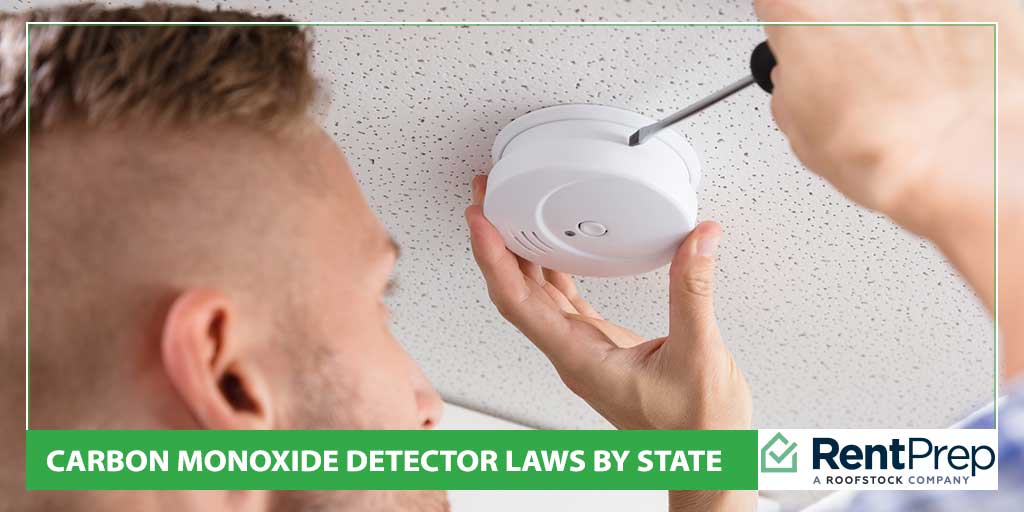
Odorless, colorless and deadly—that’s carbon monoxide, an invisible gas that can cause fatalities when people inhale it for long periods of time. This post will focus on carbon monoxide detector laws by state so you know if you’re following proper procedures.
A table of contents for carbon monoxide detector laws by state
- What is carbon monoxide?
- Are carbon monoxide detectors required?
- Carbon monoxide detector requirements by state
- Lease agreements and carbon monoxide detectors
- FAQs on carbon monoxide detectors
What is carbon monoxide?

Carbon monoxide is emitted in combustion fumes from stoves, lanterns, gas ranges, gas heating systems and burning charcoal or wood stoves. This silent killer can permeate a home or apartment without landlords or residents even knowing it until it’s too late. Carbon monoxide poisoning is a serious illness and if exposed for too long, can result in death.
Detecting excess amounts of carbon monoxide gas is easily done with the installation of carbon monoxide detectors or alarms. Similar to smoke detectors, these devices alert residents of carbon monoxide exposure.
It’s important for landlords to be aware of the dangers of carbon monoxide exposure for a range of reasons. Of course, tenant safety is the most important reason.
Are carbon monoxide detectors required in rental properties?
The laws on carbon monoxide detectors are determined at the state level. Typically the law will be consistent whether it is a rental property or a personal home.
For instance in New York State every single-family home, two-family home, condominium, cooperative and each unit of a multiple dwelling building require a working CO detector. (source: amtrustgroup.com)
Carbon monoxide detector requirements by state
Many states have established laws requiring carbon monoxide detectors in any residence and some specifically mention that landlords are responsible for installing and maintaining them. There are penalties for neglecting to install detectors, from fines to more serious charges in certain instances.
The states that absolutely require carbon monoxide detectors in residential buildings are:
- Alaska
- Arkansas
- California
- Colorado
- Connecticut
- Florida
- Georgia
- Illinois
- Maine
- Maryland
- Massachusetts
- Michigan
- Minnesota
- Montana
- New Jersey
- New Hampshire
- New York
- North Carolina
- Oregon
- Rhode Island
- Texas
- Utah
- Vermont Virginia
- Washington
- Wisconsin
- West Virginia

State statutes concerning carbon monoxide detectors and alarms vary on what is allowed and who is responsible.
Here are some examples of some of these laws:
- In California, the law requires the installation of approved detectors in single-family dwellings, including rental properties.
- In Oregon, the law actually prohibits landlords from renting residential properties with a carbon monoxide source unless an approved carbon monoxide alarm is properly installed.
- In Virginia, the carbon monoxide detector law specifically prohibits a tenant from tampering or removing a carbon monoxide detector from the property, but allows any tenant to install a detector in a rental unit if the landlord has not done so.
Lease Agreements and Carbon Monoxide Detectors
The best way to ensure that carbon monoxide detectors are properly working at all times is to include an addendum with the lease agreement that outlines the various responsibilities. Make sure you have a carbon monoxide addendum with the lease agreement which verifies that working carbon monoxide detectors have been installed in compliance with the state laws. This is to protect you from any liability down the road.
The carbon monoxide detector addendum should also specify that the tenant is responsible for changing out the batteries twice per year. It should state that the tenant agrees not to tamper with the detector and that he or she will reimburse the landlord if the detector is damaged due to tampering.
In summary, carbon monoxide detectors and alarms are a valuable tool in ensuring the health and safety of your tenants. It’s also a key part of ensuring that your property is in compliance with state and municipal requirements concerning installation and property maintenance. The minimal amount of money it takes to purchase detectors and install them is well worth it when it comes to safety and security.
FAQs on carbon monoxide detectors
Is a carbon monoxide detector a legal requirement?
This will depend on your state and situation. You’ll want to research your state laws for your specific situation. Is it a rental, commercial, or personal residence? Look above to see if your state is featured on the list, if it is go to this link and enter your state for more details.
Do apartments have carbon monoxide detectors?
If you’re looking at your apartments detectors, inspect them closely. Some detectors serve a dual purpose as a smoke alarm and carbon monoxide detector. Some detectors are required in apartments while others are not and this will depend on your state.

